- Home
- Andrew Marr
A History of Modern Britain Page 2
A History of Modern Britain Read online
Page 2
Andrew Marr, 2008
Prologue
The play starts on the afternoon of 28 May 1940, at a meeting of the war cabinet in the Prime Minister’s office in the old House of Commons. There are only a few players. There is Winston Churchill who has become the nation’s leader only eighteen days earlier. He is seen by most of the Establishment and many Conservatives as a rather ridiculous, drunken and dodgy man with a penchant for wild speeches and silly hats. Behind their gloved hands they call him the ‘rogue elephant’, even ‘the gangster’. Among those lukewarm about him becoming the King’s first minister less than three weeks before, had been the King. In Labour circles he was widely regarded as an enemy of the working class, the pink-faced toff who, years ago, had ordered in the army against strikers. Now Churchill has just ordered British troops at Calais to fight without hope of evacuation to try to protect the 200,000 left on the beaches at Dunkirk, who might be saved. He regarded it as a stand-and-die order which he said left him ‘physically sick’. He had also been trying to barter with the Americans for desperately needed destroyers. So far they had been no help. With thousands of British troops making it back across the channel every hour, there was still some hope of rescuing the bulk of the army. But German invasion loomed and without heavy weapons, that seemed a hopeless prospect. Churchill had just been asked to approve plans for the evacuation of the Government and the Royal Family, as well as the Bank of England’s gold, to Canada. Like the King and Queen, he refused to contemplate this.
Around the table with him were two men ever afterwards associated with appeasement. There was the former Prime Minister Neville Chamberlain whose ‘peace in our time’ negotiations in Germany with Hitler had made him a national hero until, very quickly, Hitler turned him into a national fool. He was dying. There was the Conservative Foreign Secretary, Lord Halifax, who on earlier visits to Germany had found Hitler ‘most sincere’ and Goering ‘frankly attractive’, a composite character like ‘a great schoolboy…film star, great landowner…party manager, head gamekeeper at Chatsworth.’ Much favoured by the Court, a lanky, wry, religious and reactionary man, Halifax had been expected to become Prime Minister himself. But in the Lords, he was the wrong kind of Tory for these dark days and would soon be packed off to be ambassador in Washington. In this government of national unity, along with the Liberal leader Archibald Sinclair, were two Labour men. Clement Attlee had become leader of his party almost by accident and was little known in the country. Terse, patriotic, rather colourless, the idea that he would one day be remembered as a great Prime Minister would in 1940 have seemed outlandish. Then there was Arthur Greenwood, a former teacher who had stood in for Attlee during his recent illness. Greenwood is little remembered today. He was a much-loved Labour figure before the war but proved to be a poor minister. In his lifelong fight with the bottle, the bottle won every round. But many second-rate people find themselves called to a moment when history turns, and this was Arthur Greenwood’s day.
In front of the war cabinet was a simple question. After the devastating success of Hitler’s armies in slicing through Belgium, the Netherlands and France, was it time to try to cut a deal? Halifax and Chamberlain were both in favour. The Italian dictator Mussolini had been touted as a go-between and various bribes for his good offices had been discussed. The Italians might take Gibraltar, Malta, Suez, Kenya and Uganda as part of their payment to stop the invasion of the British Isles. The terms might be these. Britain would accept Hitler as overlord of Europe but would be allowed to keep her Fleet and the rest of her Empire, including India. Churchill had not yet rejected any deal, on any terms, but he was acutely aware that if talk of talks leaked out, the effect on national morale would be devastating. Churchill also believed that any terms offered by Berlin would include handing over the Royal Navy and the creation of a pro-Nazi puppet government in London. Half American himself, he believed that in the end the United States would come into the fight even if Britain was invaded. Surrounded by dim hopes, fears and question-marks, this was ‘make your mind up time’.
Had the gathering been only of Conservative politicians Winston would have been outvoted. Attlee and Greenwood, however, were solid for fighting on and for refusing to negotiate or surrender. So by a squeak Churchill had his majority. Fortified by this, his mood revived and he quickly summoned the full cabinet, where in true Churchillian English he told them: ‘I am convinced that every man of you would rise up and tear me down from my place if I were for one moment to contemplate parley or surrender. If this long island history of ours is to end at last, let it end only when each one of us lies choking in his own blood upon the ground.’ Or that at least is how he recorded it later. Ministers jumped up, shouting approval and thumped the old man on the back. Later he said he would have been dragged from office if he had tried to surrender; every minister was ready, with his family, to be killed ‘quite soon’.
As we have seen this was an exaggeration. Quite a few British politicians would have done a deal. Washington had been privately told by its London ambassador that the British would surrender. Looking back, such a thing may seem impossible – unthinkable. But it was quite possible and it was seriously discussed. This was the moment when Britain was on the edge and her modern story begins. From that decision on that day, everything follows. First, there was the war, from the Battle of Britain, through Pearl Harbor to the final defeat of Germany and Japan. So, second, the world was differently shaped. The end of the British Empire, once the world’s greatest, and the rise of the United States as ruler of the free world occurred for complicated reasons. But they can be plausibly traced back to what Winston, Clem and Arthur agreed was the right thing to do on that difficult day in May. That decision made contemporary Britain, with her weaknesses and strengths, which are the subject of this book. Many unexpected and surprising things followed. Neither Churchill nor Attlee got the Britain they wanted. Instead, unwittingly, they made us.
The Second World War was such a shattering, overwhelming experience for Britain that it is tempting to isolate the country we became afterwards from the pre-war Britain, as if a huge blade fell across the national story. In obvious ways this is true. The war changed Britain physically and industrially, destroying city centres; it ultimately changed who lived here by encouraging both immigration and emigration. It changed Britain’s political climate and our attitude to government. It even changed, through a subsequent jump in the birth rate, relations between the generations. Yet in other ways post-war Britain was simply a continuation of the Britain of the thirties. When it was all over, and before Churchill was voted out of power, the Parliament of 1945 was the same one elected in 1935, a Commons frozen from another time. Deference and respect for the Royal Family, belief in the superiority of the white man, a complacent assumption that British manufacturing was still best…all that survived seemingly unaltered through the years of danger.
Britain still believed herself to be in her imperial heyday, mistress of the seas. Though we think of it as essentially Victorian, the British Empire, declaring itself the first ‘world state’ had continued to grow right up until the mid-thirties. At the beginning of the Second World War there were some 200 colonies, dominions and possessions connected to London, covering more than 11 million square miles. The Empire embraced Pacific tribesmen and Eskimos, ancient African kingdoms and the rubble of the great Mughal empire, Australian farmers and the gold-miners of South Africa. It ran from the Scottish Highlands to the Antarctic, from the French-speaking villages of Quebec to the mosques of the Middle East. For a comparatively small nation of fewer than 50 million people to have acquired all this might seem a global absurdity, a large joke in the history of humankind.
Relatively few of those square miles helped the British economy thrive yet the empire was considered the essence of British power, a global financial and trading system independent of the rising might of the United States. ‘The Empire on which the sun never sets’ was not poetic, but factual. Imperial feeling still suffu
sed the Britain of the forties and fifties. Schools displayed the famous red-splattered maps and taught the history of Clive’s battles in India and the achievements of missionaries in Africa. Children’s encyclopedias brimmed with information about the calico industries of the subcontinent, or those useful rubber trees in Malaya. Middle-class bookshelves groaned with Kipling, Somerset Maugham, Henty and T.E. Lawrence. The Empire was everywhere, inside the home and out, in street names and statues, to the Indian knick-knacks and elephant-foot umbrella stands, Bombay gin and Imperial Leather soap, the rhododendron bushes from the Himalayas, words like tiffin and bungalows and the eating of kedgeree for breakfast by all those retired Indian civil servants and administrators in the Home Counties. There were the names of the major companies – Imperial Chemical Industries, Home and Colonial Stores, British Imperial Airways, the Imperial Rubber Company. Empire Day was celebrated until 1958. More seriously there was continuing large-scale emigration from the British Isles to Africa, Canada, Australia and New Zealand. Until the sixties, one in five emigrants were heading from the UK to the old ‘Crown Commonwealth’ countries and more than a million Britons went to Australia alone during 1946-72. On wet days, back home, there were the endless Pathé and Movietone newsreels of Royal visits to New Zealand or some dependent territory.
Twenty years earlier the Royal Navy, like the British Empire, had seemed at its zenith, a world-dominating power. By the end of the First World War, it had no fewer than 61 battleships, more than the American and French fleets put together, plus 120 cruisers and 466 destroyers. Without this awesome force, and the scores of naval bases and coaling stations, all controlled by the superbly organized Admiralty in London, the Empire would have been impossible to defend.
The navy was for the British what the roads and legions had been for the Romans, the thin, steely web holding together many different lands and people. By the twentieth century, with a quarter of the world under British rule, no country had ever claimed power over so many people and so much land. It had been made possible by a centuries-old British love affair with salt water, and by the Victorian enthusiasms for steam power and the appliance of science. In the twentieth century these traits, which had made Britain Great, were in decline. Even so, the navy continued to enthral the British in the first half of that century in ways we now struggle to remember; sea shanties on music-hall stages, the books of Marryat and Forrester for boys, the great Spithead reviews, the Dreadnoughts on cigarette cards, the blue-and-gold uniforms at Court. Drake and Raleigh, Cook and Nelson, were the subjects of ten thousand history lessons in almost every school in the country. To be British was to thrill at the sight of a White Ensign.
Many post-war trends had started long before the war and to understand post-war Britain we must take a bird’s-eye view of an earlier, only half-familiar country. One way to do this is to travel with some of the talented writers who set out to discover their own nation between the wars. Part of the aftershock of the First World War, which had made people look again at just what they had been fighting for, it was a great time for such journeys of reportage. Not since Boswell and Johnson had heaved themselves onto ponies and into jolting carriages to visit Scotland in the eighteenth century, and the great radical newspaperman William Cobbett had set jogging off on his ‘rural rides’ through the depressed countryside of England in the 1820s, had journeys round Britain been so popular. The twenties and thirties were a golden age of road travel. While most roads had been like thin twists of twine following ancient routes, bumpy, frayed and narrow, now there were new trunk roads with bright ‘roadhouses’ and restaurants awaiting the traveller. Rural roads, empty by modern standards and almost unpoliced, made car travel for those who could afford it a moderately dangerous delight. For those who could not, the boom in motor-coaches, or buses as we would call them, and in the open-topped charabancs, made rural and coastal Britain available as it had never been before.
Some of the travellers, such as H.V. Morton, who went ‘in search of England’ in a bull-nose Morris car in 1927, were looking for a lost, green land. He was a little late. The real Britain was heavily industrialized and urban by then, and had been for nearly a century. Morton knew this perfectly well and defended himself by claiming that ‘the village and the English countryside are the germs of all we are and all we have become.’ In this, he stands for an ancient tradition of English writing, running back through Thomas Hardy, Kipling and Chesterton, right the way to the poets of Jacobean times. The real England is green, remote, local, wild, ancient and with a wisdom of her own. Perhaps, as well as being a little late, he was just in time, for this was before the urbanites had moved in and finally finished off the traditions that reached back to the Middle Ages. His tour matters because it stands for an idea of Britain which keeps its hold on many people well into the post-war period. His book was hugely popular, capturing post-industrial rural Britain before our current economy of supermarkets and super-roads finally killed it off during the seventies and eighties.
Looking for quaintness, Morton finds it everywhere, from old gallows left on remote hills, to ladies taking tea in ancient church premises. He finds the ‘Furry’, or floral, dancers of Helston in Cornwall, jigging in their top hats, flint-chippers in Norfolk, the last almshouse in England and even the last bowl-turner, making wooden bowls with Anglo-Saxon technology. There are ghosts, cobbles, eaves, lanes, Roman ruins, ancient pubs serving mahogany-coloured beer and in general more quirk than any normal person could consume at one sitting. Birmingham, where Morton grew up and worked successfully as a journalist, is dismissed without a visit as ‘that monster’ and Manchester is only distantly glimpsed as ‘an ominous grey haze in the sky’. On the rare occasions that Morton is roused to genuine anger it is, like Cobbett, on behalf of the declining and disregarded farming community.
Green England’s grip on the national imagination should not be underestimated. Comic novels by P.G. Wodehouse and brain-teasing crime novels by Agatha Christie were set in its timeless villages, peopled by ancient families, vicars and well-educated old maids whose lovers had died in the trenches. The cartoons of Punch portrayed England’s cricket greens, church halls, peasant-crowded lanes and stables, interrupted by the modern world through charabanc tours, but still somehow essential. At the start of the war the Ministry of Labour sent a group of artists, mainly conscientious objectors, off round the country to draw and paint the barns, parish churches and country houses of old England before the Nazi bombers and housebuilders could destroy them: the scenes chosen look like a visual version of Morton’s journey.
Yet British agriculture and therefore the British countryside, an early casualty of the global economy, had been in a long slump which lasted from the 1870s until 1940, with only the interruption of the Great War to lift prices. The opening up of the great prairies of North America, the easier transportation of grain and meat with steamships, refrigeration and railways, and even the use of barbed wire to extend the farms of Canada and New Zealand, all badly hurt home producers. From the middle years of Queen Victoria to the beginning of Hitler’s war, two-fifths of arable land had gone out of use, and millions of farm workers left the countryside for ever, a trend mildly ameliorated in the mid-thirties by the arrival of tariffs and labour-saving technology. Much of the upland areas had been abandoned to thistles and weeds and were only returned to productive use, along with abandoned arable land, in the extraordinary circumstances of the Atlantic blockade. Some 7 per cent of the great country houses were demolished between the wars. Many more were converted into hotels, hostels, asylums and schools. The reality was far removed from the nostalgic, muzzy haze through which Morton blissfully pootled but the haze was what Whitehall thought worth recording when the nation’s future was threatened by Germany.
A few years later another prolific successful literary journalist and writer set out on a tour. John Boynton Priestley was brought up in Bradford, and moved south. A large, intensely patriotic, lugubrious-looking pipe-smoking man, Priestley complai
ned that his bestselling novels made people think of him as ‘a bovine, hearty sort of ass’ producing ‘watery imitations of Dickens’. Sneered at and disregarded by university academics and posher writers, Priestley’s book about England had a great influence on how people understood their own country. He was loquaciously political and when he set out on his ‘English Journey’ in 1933 almost a quarter of the British workforce was unemployed; in some areas, nearly everyone was unemployed. Priestley wanted to rub the nose of southern middle-class Britain in the reality of the other nation. Rattling around in buses and trams, the heart of his journey was in places like Wolverhampton, St Helens, Bolton, Liverpool, Gateshead, Jarrow and Shotton, where he searched out slums and blighted shipyards, grim factories and desperate mining villages. He found wastelands, industrial decline so bad that it made him question whether the whole nineteenth-century industrial revolution had been worth it.

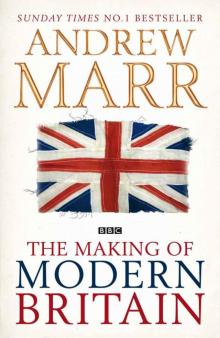 The Making of Modern Britain
The Making of Modern Britain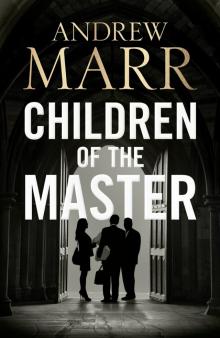 Children of the Master
Children of the Master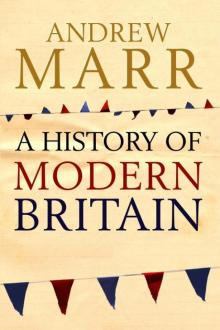 A History of Modern Britain
A History of Modern Britain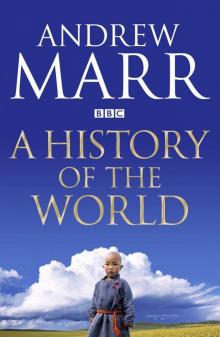 A History of the World
A History of the World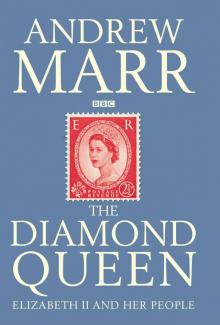 The Diamond Queen
The Diamond Queen